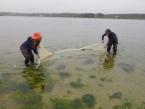From the Jan. 13, 1967 edition of the Gazette by Edith Blake:
Tracking down information about eels and the skinning thereof, the path led me to the blacksmith shop of Milton Jeffers in Edgartown.
Mr. Jeffers came out of his shop armed like Neptune. He handed Arthur W. Bradbury his weapon.
“What’s that?” I asked, for whatever it was, was beautifully fashioned, and it resembled a small grass rake with several of the tines curled sideways.
“This is an eel spear,” said Mr. Bradbury a little uncertainly, since he was not sure I was serious. Mr. Jeffers came to his rescue by explaining that this type of spear was poked down into the mud, and hopefully on its way up one of the barbs would hook an eel.
“In the summer the spears are different and the points are on the bottom. This is because the eels are swimming then. In the winter they are in the mud,” he said.
“You know once people here went eeling for a living. It was no trouble to get a barrel or two of eels. But not any more. When the eel grass went, so did the scallops and the clams and the quahaugs and the eels. That was the end of it.
“Was it true,” I asked, “that they used to hold eel skinning contests?”
“Come and talk to my father,” Mr. Jeffers said. “He could tell you better than I can.”
So we left the shop and entered the house.
“Yes, it’s true,” Lawrence Jeffers said, “I don’t know as they were real contests, or that there was any betting, but they used to skin them down at old Chadwick’s.”
“That’s the coal wharf now,” interjected Milton Jeffers.
“The old people used to do the skinning, when they couldn’t go eeling,” said Laurence Jeffers. “They did it that way with the scallops. The older people cut them, because they had so many scallops that there would be scallops on the bench and scallops under the bench and still more scallops in the boat.”
Mrs. Lawrence Jeffers entered the room just then and said, “I remember opening scallops all day. Every free minute I had, I’d be opening scallops.”
“Have you always been a fisherman?” I asked Lawrence Jeffers.
“Yes,” he replied. “I fished for clams and quahaugs and scallops and eels. I remember when seventy or eighty or ninety boats would be out at once quahauging in Katama Bay. About all there was to do in those times was eeling and clamming. We used to live on Chappaquiddick.”
“And all four of my children were born over there,” added Mrs. Jeffers.
“Do you remember the old ferrymen? I asked.
“Yeh, Midgie. Do you know Midgie? asked Lawrence Jeffers.
“No, who’s Midgie?”
“Midgie’s Tony Bettencourt. That’s what we called him, didn’t you know that?”
“What about the ferrymen before that?”
“I remember Charles Osborn and James Yates used to row the ferry but we had our own boat. Used to get back and forth by the white ash.”
“We moved away from there when Milton here was 10 or 11, and that wasn’t yesterday,” said Mrs. Jeffers.
“We were living over at the Huxford house, that Midgie owns now, when they brought telephones. You know, the house with the whalebone out front. I think he’s moved the bone now. We moved to Chappy in 1911.”
“I came from Gay Head,” said Mrs. Jeffers, “and lived in Edgartown for four years before I married Mr. Jeffers. I raised all four children over on Chappy, and when one child moved away, I was afraid they all would be gone, so we moved here. My husband didn’t want to come. He hates Edgartown.”
“I miss Chappy,” Mr. Jeffers said, and I liked Chappy the way it was. When the first summer people came, everyone was on everyone else’s land and got along fine.
“Now this zoning they have. What is somebody who doesn’t have money going to do? They can’t build a big house and buy lots of land. It’s bad.”
“I’d like to come back when Milton has some eels and take pictures of him skinning them. Is that possible?” I asked.
“No,” said Mr. Jeffers. “We’re going to take pictures of you skinning ‘em.”
“It used to be a lot of work fishing,” said Mr. Jeffers. “We used to fill bushel bags with eels and if we didn’t get two or three bags, we didn’t think we had done much. Now people don’t do too much anyway.
“You know they had to change the parking to the other side of Main street ‘cause the people didn’t like to walk across the street to the shops.”
The subject was rapidly getting away from eels and the skinning thereof, so I took my leave.
Having found out all I wanted to know about eels without actually having to see one, I departed, but before I was out of earshot, Lawrence Jeffers stuck his head out of the kitchen door and called, “Don’t forget we’re going to take a picture of YOU skinning an eel.”
Compiled by Hilary Wall
library@mvgazette.com





Comments (1)
Comments
Comment policy »